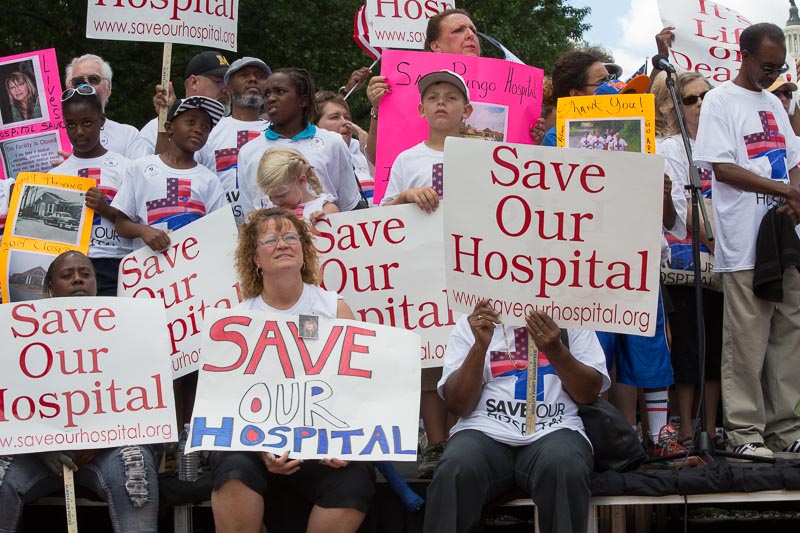
I keep seeing pain in my community, people calling me crying and that’s why I’m hollerin’ and fussin”… I ran into something bigger than I am. I can’t let people continue to die.
— Mayor Adam O’Neal of Belhaven North Carolina
Quoted December 16, 2016
The question now is who will hear the cry of the community and help them get and regain the health service they once had.
— Rev. Dr. William Barber, President of the North Carolina NAACP
Statement December 29, 2016
In July 2014 Portia Gibbs of Belhaven, North Carolina had a heart attack. The 48 year old wife and mother could not be given care in nearby Pungo District Hospital because a few days earlier Vidant Health (a private non-profit corporation with $1.5 billion in revenues) which had taken over the hospital with a promise to “improve, sustain, and expand” it, shut it down in the name of revenues. Portia Gibbs died in a parking lot waiting for a helicopter to take her to another hospital many miles away.
Portia Gibbs is not and will not be forgotten.
In response to her death Mayor Adam O’Neal, a self described conservative Republican, launched a campaign to bring the hospital back to life. He had few resources but the firm knowledge that others in Belhaven would be hurt or killed. Along with long time civil rights fighter Bob Zellner and the support of the Moral Mondays leader Rev. William Barber, he walked 273 miles to Washington, D.C. to draw attention to what had happened to Portia and their community.
He organized a second walk a year later, this time accompanied by members of the Kairos Center and other people of faith and conscience from around the country. He talked with every politician he could find about the threat not just to Belhaven, but to the hundreds of other rural hospitals that were closing. Along with others from Belhaven, he set up “Camp Resurrection” (listen to an online seminar led by Bob Zellner while he was at Camp Resurrection, here) to keep a vigil on the hospital building, which was threatened with demolition, and against all odds kept alive the possibility that the lifesaving hospital could reopen.
On December 29, 2016 the millions of dollars of a powerful corporation, the indifference of politicians, and the use of ethically suspect legal maneuvers prevailed. Pungo Hospital was demolished. Vidant Health and its defenders should be ashamed of themselves. Mayor O’Neal and the other fighters in Belhaven should know that they have supporters all around the country who’ve been inspired by their tireless and often unrecognized efforts, and are committed to continuing on alongside them, however we can.
The fight for Pungo hospital will not be forgotten and the fight for rural health care will continue. It will continue, because more and more people who are poor and struggling are seeing with increasing clarity that what happened to Portia Gibbs was not an isolated accident.
Whether in rural North Carolina, the streets of Baltimore and St. Louis, homeless encampments in California and Washington state, communities along the poisoned Gulf Coast in Louisiana or poisoned and threatened rivers in Flint or Standing Rock, systematic policies and decisions each year kill poor people on a massive scale.
As Mayor O’Neal repeatedly pointed out in 2015, some 243 rural hospitals were scheduled to close and if that resulted in just 10 preventable deaths per hospital, it would be the equivalent of a 9/11-scale attack each year. The national figures for those killed by lack of health insurance are even greater. According to a 2009 Harvard Medical School study, some 45,000 die unnecessarily each year. And a 2011 Mailman School of Public Health study has documented that over 250,000 deaths annually can be attributed to poverty and income inequality. Whatever the distinct features, what unites the devastation of community after community is a system that values private profit and power over the common good and our basic human rights.
For in any moral society that values each and all human life, the death of Portia Gibbs, as she waited more than an hour to get to an emergency room, would have resulted in immediate action to improve health care for the people of Belhaven. The continuing unnecessary deaths of hundreds of thousands of people like Portia Gibbs would result in large scale national actions to guarantee the right to quality health care and an end to poverty.
Instead, as the demolition of Pungo Hospital began, we are being promised the destruction of the heath care systems we have and more attacks on communities that are already being devastated. What can be promised in return is a growing movement on a national scale, a movement built on and aimed at realizing the values that drove the fight to save one hospital in Pungo.
Portia Gibbs will not be forgotten. Pungo Hospital will not be forgotten.